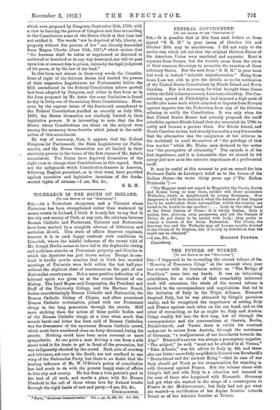TOLERANCE IN THE SOUTH OF IRELAND.
[To THE EDITOR OP THY " SPECTATOR."1
SIR,—As a Protestant clergyman and a Unionist whose Unionism has been strengthened rather than weakened by recent events in Ireland, I think it is only fair to say that in the city and county of Cork, at any rate, the relations between Roman Catholic and Protestant, Unionist and Nationalist have been marked by a complete absence of bitterness and sectarian ill-will. This state of affairs deserves emphasis, because it is in such happy contrast with conditions in Limerick, where the baleful influence of the recent visit of Mr. Joseph Devlin seems to have led to the deplorable rioting and malicious attacks on Protestant property and liberties to which the Spectator has just drawn notice. Except in con- trast it hardly merits mention that in Cork two crowded meetings of Unionists were held within the last half-year without the slightest show of resentment on the part of our Nationalist countrymen. But a more positive indication of a tolerant spirit was given us at the recent funeral of our Bishop. The Lord Mayor and Corporation, the President and Staff of the University College, and the Harbour Board, bodies overwhelmingly Roman Catholic and Nationalist, the Roman Catholic Bishop of Cloyne, and other prominent Roman Catholic ecclesiastics, joined with our Protestant clergy in the long procession through the streets. Still more striking than the action of these public bodies and of the Roman Catholic clergy, at a time when much that sounds harsh and bitter has been said of Roman Catholics, was the demeanour of the enormous Roman Catholic crowd, which must have numbered close on forty thousand, lining the streets. Nothing could have been more reverent or more sympathetic. At one point a man driving a van from a side street tried in his haste to get in front of the procession, but was indignantly checked by the crowd. Such acts of courtesy and tolerance, not rare in the South, are not confined to one wing of the Nationalist Party, but there is no doubt that the healing influence of Mr. W. O'Brien's policy of conciliation has had much to do with the present happy state of affairs in this city and county. He has done a true patriot's part in the best of all work, and merits a place with Sir Horace Plunkett in the roll of those whose love for Ireland breaks through the rigid limits of sect and party.--I am, Sir, &c.,
COsKAGsNala Bryce, "American Commonwealth." Vol i., pp. 25, 222, 357. Ed. UK.


























































 Previous page
Previous page